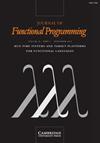Sparcl:部分可逆计算语言
IF 0.6
3区 计算机科学
Q4 COMPUTER SCIENCE, SOFTWARE ENGINEERING
引用次数: 0
摘要
可逆性是计算机科学中的一个基本概念,在软件开发中有多种表现形式(序列器/解序列器、解析器/打印机、重做/重做、压缩器/解压缩器等)。完全可反转性必然要求双射性,但直接通过组合双射函数来开发可反转程序的方法限制太多,难以发挥作用。在本文中,我们采取了一种不同的方法,将重点放在部分可逆函数上--如果部分参数是固定的,这些函数就会变成可逆函数。最简单的例子是加法,当固定其中一个操作数时,它就会变得可逆。更复杂的例子包括基于熵的压缩方法(如哈夫曼编码),它携带输入符号的出现频率(在某些格式中,如哈夫曼树),固定这些频率信息会使压缩方法变得可逆。我们开发了一种语言 Sparcl,用于以自然的方式对此类函数进行编程,其中部分可逆性是规范,双射性是特例,因此在不影响正确性的情况下获得了显著的表达能力。设计这样一种语言的挑战在于,既要允许普通编程("部分 "部分)与可反转部分自由交互,又要通过构造保证可反转性。Sparcl 语言是线性类型的,并有一个类型构造函数来区分可反转计算的数据和不可反转计算的数据。我们介绍了该语言的语法、类型系统和语义,并证明 Sparcl 能正确保证其程序的可逆性。我们通过从前序和无序遍历中重建树、哈夫曼编码、算术编码和 LZ77 压缩等示例来证明 Sparcl 的表达能力。本文章由计算机程序翻译,如有差异,请以英文原文为准。
Sparcl: A language for partially invertible computation
Invertibility is a fundamental concept in computer science, with various manifestations in software development (serializer/deserializer, parser/printer, redo/undo, compressor/decompressor, and so on). Full invertibility necessarily requires bijectivity, but the direct approach of composing bijective functions to develop invertible programs is too restrictive to be useful. In this paper, we take a different approach by focusing on partially invertible functions—functions that become invertible if some of their arguments are fixed. The simplest example of such is addition, which becomes invertible when fixing one of the operands. More involved examples include entropy-based compression methods (e.g., Huffman coding), which carry the occurrence frequency of input symbols (in certain formats such as Huffman tree), and fixing this frequency information makes the compression methods invertible. We develop a language Sparcl for programming such functions in a natural way, where partial invertibility is the norm and bijectivity is a special case, hence gaining significant expressiveness without compromising correctness. The challenge in designing such a language is to allow ordinary programming (the “partially” part) to interact with the invertible part freely, and yet guarantee invertibility by construction. The language Sparcl is linear-typed and has a type constructor to distinguish data that are subject to invertible computation and those that are not. We present the syntax, type system, and semantics of the language and prove that Sparcl correctly guarantees invertibility for its programs. We demonstrate the expressiveness of Sparcl with examples including tree rebuilding from preorder and inorder traversals, Huffman coding, arithmetic coding, and LZ77 compression.
求助全文
通过发布文献求助,成功后即可免费获取论文全文。
去求助
来源期刊

Journal of Functional Programming
工程技术-计算机:软件工程
CiteScore
1.70
自引率
0.00%
发文量
9
审稿时长
>12 weeks
期刊介绍:
Journal of Functional Programming is the only journal devoted solely to the design, implementation, and application of functional programming languages, spanning the range from mathematical theory to industrial practice. Topics covered include functional languages and extensions, implementation techniques, reasoning and proof, program transformation and synthesis, type systems, type theory, language-based security, memory management, parallelism and applications. The journal is of interest to computer scientists, software engineers, programming language researchers and mathematicians interested in the logical foundations of programming.
 求助内容:
求助内容: 应助结果提醒方式:
应助结果提醒方式:


